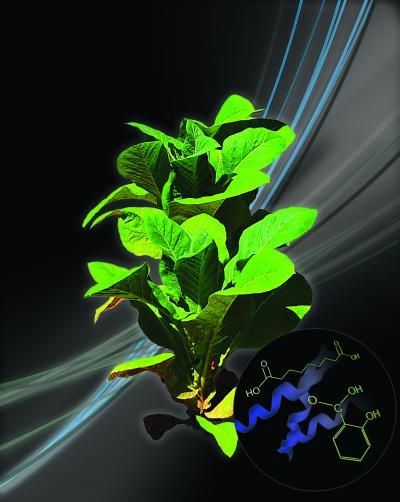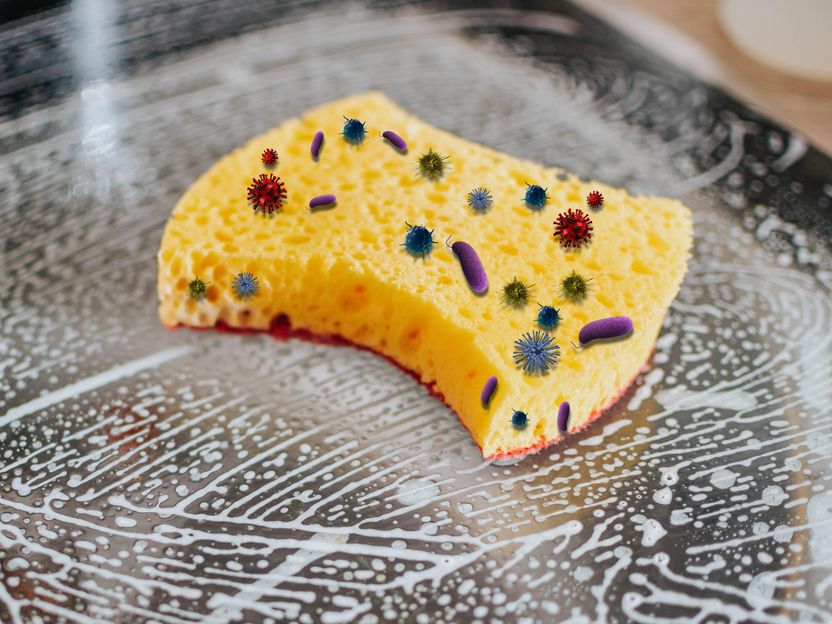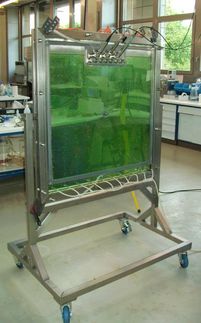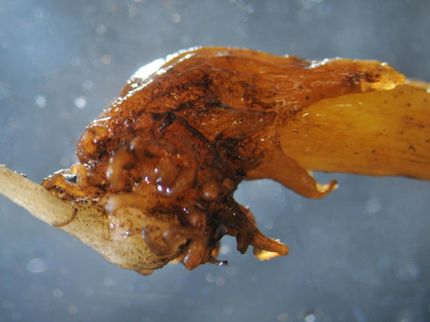Researchers unravel role of priming in plant immunity
Scientists have discovered a naturally occurring compound that triggers a plant's immune system, thereby protecting the plant from a secondary bacterial infection. The patent-pending discovery could lead to an effective, inexpensive and environmentally safe way to improve plants' resistance to disease, according to research published in Science.

Illustration by Oak Ridge National Laboratory
"The potential for crop protection for organic and conventional farming is strong," said Jean Greenberg, associate professor of molecular genetics and cell biology at the University of Chicago and corresponding author of the study. "This could lead to better food quality and higher agricultural yields. We're very excited to see something so practical come out of our lab that could have an impact in the real world."
Although it has long been known that plants have immune systems, just how these systems function has been the subject of intense study. Greenberg and colleagues determined crucial steps and identified new compounds involved in the immune system of Arabidopsis, a plant in the same family as mustard, cabbage, broccoli and cauliflower.
When the pathogen Pseudomonas syringae attacks Arabidopsis, the plant greatly increases its production of azelaic acid, which is then transported via the plant's vascular system to other parts of the plant. The azelaic acid does not directly induce major defenses, but confers on plants the ability to mount a faster and stronger defense response if and when the plant is attacked again. It does this by increasing the production of salicylic acid, which is known to stimulate microbial resistance in some plants. The researchers also found that azelaic acid stimulates the production of AZ11, a protein that the researchers discovered. AZ11 helps prime the plant to build up its immunity by generating additional salicylic acid.
Azelaic acid's role as a signal in plant immunity represents a significant discovery because it is inexpensive and a natural compound already found in Arabidopsis and many other plants, the researchers said. Furthermore, it is considered safe since it has already been tested in humans. It is used in anti-microbial creams, for hair loss and to treat rosacea. And since azelaic acid only primes a plant's immune system, the researchers predict that its use will not create a burden on the plant or otherwise detract from the plant's health or productivity. Therefore, plants treated with azelaic acid would not have to invest a lot of energy in their defense until they need to do so.
"Priming is an area of intense interest to many biologists," Greenberg explained. "It is involved in the human immune response and likely plays a role in many responses to environmental changes."
The azelaic acid would be applied to plants by spraying. "This is an attractive way to enhance crop protection because it's natural and doesn't involve genetic modifications," Greenberg said. "Arabidopsis is often used as a model organism for studying higher plants, and we determined that azelaic acid is effective with other families of plants, as well."
Azelaic acid has a lot of potential in agriculture because it is "green," safer than chemicals, and found in many plants, including wheat, rye and barley, according to Wade Williams, Project Manager at the Office of Technology and Intellectual Property at the University of Chicago. "We have found some interest in this idea from agricultural companies, but not much now due to the difficult economy," he said. "We hope that publication in such a prominent, peer-reviewed journal as Science will generate renewed interest."
Most read news
Topics
Organizations
Other news from the department science

Get the life science industry in your inbox
By submitting this form you agree that LUMITOS AG will send you the newsletter(s) selected above by email. Your data will not be passed on to third parties. Your data will be stored and processed in accordance with our data protection regulations. LUMITOS may contact you by email for the purpose of advertising or market and opinion surveys. You can revoke your consent at any time without giving reasons to LUMITOS AG, Ernst-Augustin-Str. 2, 12489 Berlin, Germany or by e-mail at revoke@lumitos.com with effect for the future. In addition, each email contains a link to unsubscribe from the corresponding newsletter.
Most read news
More news from our other portals
Last viewed contents

Discovery of a potential new therapy for inflammatory arthritis - Researchers at the Schroeder Arthritis Institute in Toronto have made a discovery that could lead to new treatments for axial spondyloarthritis.

Evotec appoints Dr Christian Wojczewski as CEO
Adding blood pressure drug to standard antibiotics speeds up TB treatment - Study in mice shows verapamil enhances isoniazid plus rifampin antibiotic therapy
Vanderbilt researchers identify potent antibodies against HIV - Structure-based approach could lead to first effective vaccine

Excess weight, obesity more deadly than previously believed - One in six U.S. adult deaths are related to country's 'obesogenic' environment, study suggests

With “Swarming AI” Against COVID and Other Diseases - Network of German research institutions uses pioneering artificial intelligence technology to analyze distributed data

Tracking down minorities in kitchen sponges - First study on non-bacterial microbiota in used kitchen sponges
Palmomental_reflex

I.M.A. Industria Macchine Automatiche S.p.A. - Ozzano dell'Emilia, Italy
Category:Human_MHC_mediated_diseases
Meiosis























































